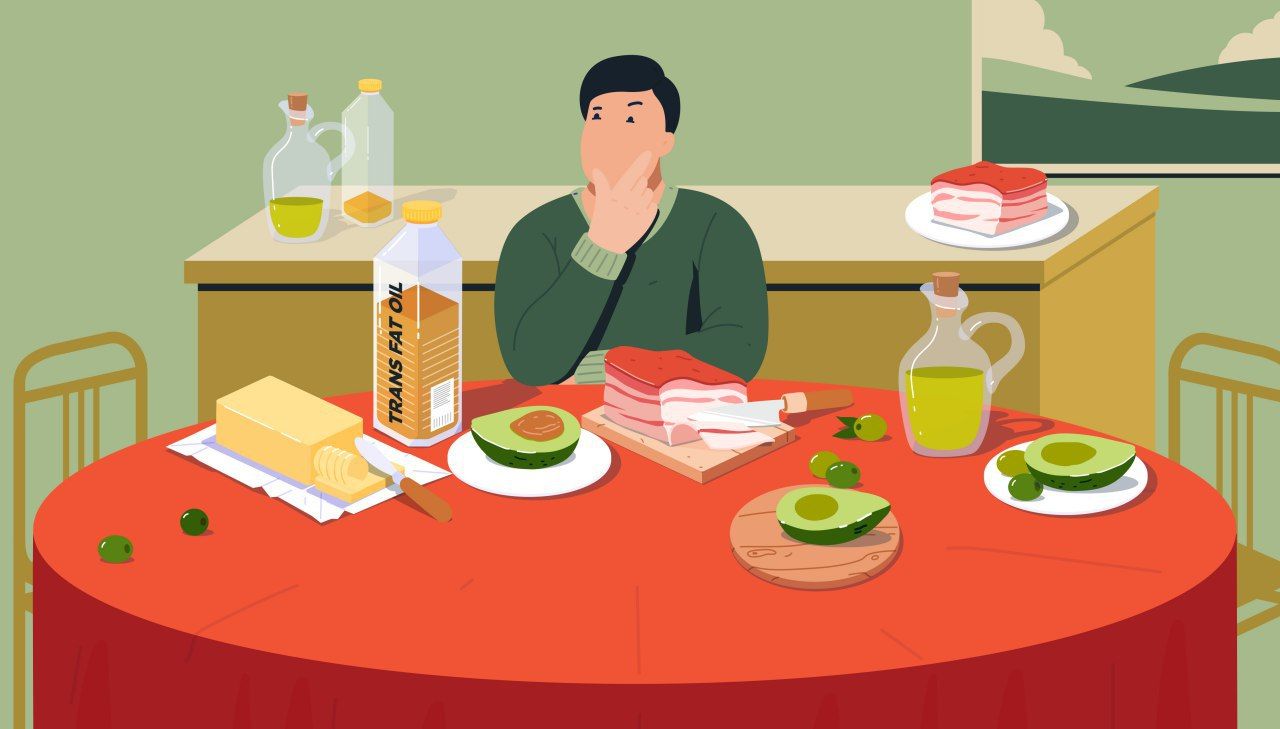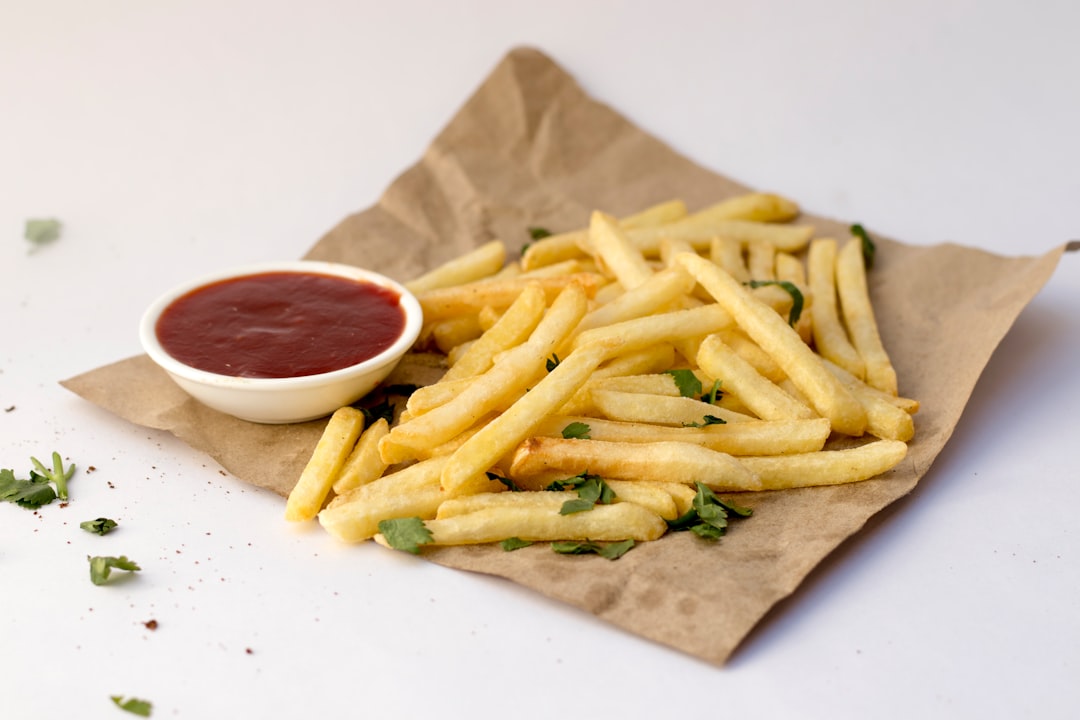This is your no-nonsense guide to fats based on the craziest questions about good fat and bad fat out there in cyberspace.
This is what happens when science geeks take their heads out of research papers and try to apply their smarts to everyday conundrums. We've selected 12 of the most popular and outlandish questions you've asked Google to answer in this article.
Next week, we'll answer all your questions on body fat, what it does and if it's bad.
We'll even address the basic facts and scientific consensus on trans fat and saturated fat, because it's a source of major confusion for many.
- 1. What is fat?
- 2. What are fats in foods?
- 3. Why is saturated fat bad?
- 4. Are bananas bad for belly fat?
- 5. Are trans fats bad for you?
- 6. What foods are high in trans fat?
- 7. Trans fat or saturated fat, which is worse?
- 8. Which fats are bad for cholesterol?
- 9. Why is fat bad for you?
- 10. Is fat in peanuts good or bad?
- 11. Do nuts contain good or bad fat?
- 12. Does avocado have bad fat? Is avocado good or bad fat?
So it’s time to right some wrongs, cross some Ts and answer those burning questions that plague the web.
What is fat?
An excellent question. First off, it’s important to distinguish dietary fat and fat in the body. The most common misconception is that, somehow, fats in the food you eat, enter the body and magically remain in that state, migrating directly to deposits on your hips, belly and walls. But that's not really how it works at all.
Photo by Pascal Mauerhofer / Unsplash
Technically speaking, fat is an organic compound with solvent properties that doesn’t dissolve in water. We will not get into complex topics like the chemical structure, but we will tell you why bananas have nothing to do with belly fat.
What are fats in foods?
Dietary fats are one of three macronutrients, the others are protein and carbohydrates. Fats come from plants and animals in many shapes and forms.
They are found in animals, who use them for similar things to us, like keeping warm, storing energy, building hormones and vitamins as well as nerve cell function.
Plants tend to use fats as rich energy sources for future baby plants, wrapping their seeds in a fatty cushion that aids growth.
When a fat is liquid at room temperature, it referred to as “oil”. Animal fats are usually saturated and stay solid at room temperature. Fish and plants tend to have unsaturated fats, but there is no strong rule. For example, coconut is a source of saturated fat.
While low levels of trans fats naturally occur in some animal products, most trans fats are industrial partially hydrogenated oils that have significant health risks.
☝️READ MORE☝️ Find out more on this topic in the question: Are trans fats bad for you?
Why is saturated fat bad?
Saturated fats are mostly found in animal products like red meat, butter, lard and dairy, but it’s also in coconuts. Eating a lot of foods high in fats that are saturated may be linked to higher heart disease risk.
There is still A LOT of debate in the scientific community about saturated fats due to issues inherent to nutritional research. And there’s a lot of confusion in the media too. Is it the meat, the saturated fat or the Western diet? These are the answers researchers need to find before they can agree.
Food doesn’t come neatly packaged in individual compounds that can be extracted and dosed perfectly to see what happens. They come wrapped up with many other compounds that can have individual and combined effects. This is what makes it hard to distinguish what's going on in the body.
That’s why we should always be very wary when one nutrient is suddenly demonised, like fat (or gluten). There are other factors to consider. For example, efficiency gains in production and distribution of animal-based foods mean that we have access to lots of affordable meat.
Let's not forget that we've basically been told for decades that animal protein is vital to our survival. And that meat-eating has traditionally been associated with higher social status. So, as Western cultural habits spread, the amount of meat consumed by people grew. We've all been eating a lot more meat. EVERYWHERE.
However, intensive production practices mean that more animals are being raised on foods that are not part of their normal diet (like corn instead of grass), which can also affect the nutritional value of the meat. In short, we can't say for sure that saturated fat is bad for your health, because there's a lot more to it.
☝️COCONUTS☝️are a plant source of saturated fats that are known to increase LDL “bad” cholesterol, and HDL “good” cholesterol too. Research is ongoing to determine whether coconut fat poses a risk for human health.
☝️Meat and gut microbes
This is something we check for in the Atlas Biomed Microbiome Test, and we are confident in the research backing it up.
1. Specific types of bacteria produce trimethylamine (TMA) from choline (found in egg yolks) and L-carnitine (found in red meat and fish).
2. TMA is absorbed by the liver and oxidised into trimethylamine-N-oxide (TMAO).
3. This compound is associated with higher risk of atherosclerosis (hardening of the arteries) and coronary heart disease.
Are bananas bad for belly fat?
There's some really bad clickbait on the internet, we know you've seen this one, we all have. So, to be clear, bananas do not magically turn into abdominal fat in healthy people. Bananas are fruit, they contain fiber, vitamins and micronutrients.
When consumed in moderation, bananas are good for your gut, your gut microbes and your overall health. In fact, it's probably even okay for diabetics to consume bananas (within reason, but always ask your GP anyway) because the fiber contained in bananas slows the absorption of sugars in the small intestine.
And that’s another reason why fibre is cool, and we should all eat more fresh fruit unless otherwise indicated by your doctor.
Are trans fats bad for you?
When you read about trans fats in the media, they are almost always talking about partially hydrogenated oils that have been modified to remain solid at room temperature like margarine and vegetable shortening.
This process allows food manufacturers to extend the shelf life of cheap vegetable oils that they put in processed foods. In addition, trans fats can occur in the process of deep-frying when some fats are heated to high temperatures.
Photo by Pixzolo Photography / Unsplash
What foods are high in trans fat
| FAST FOOD | baked goods |
| biscuits | |
| fried foods | |
| SUPERMARKET FOOD | baked goods |
| ready-to-microwave popcorn | |
| biscuits, wafers and baked goods | |
| some margarines, shortening |
Trans fats are known to lower “good” HDL cholesterol and increase “bad” LDL cholesterol. Research has linked trans fats to many diseases including colon cancer, diabetes and heart disease.
In fact, trans fats are bad enough for human health that even America’s Food & Drug Administration declared in 2015 that partially hydrogenated oils are no longer “generally recognized as safe”.
☝️FACT☝️Low levels of trans fats naturally occur in meat and dairy products.
Trans fat or saturated fat, which is worse?
Trans fats. But there’s still a lot of confusion in the media and research labs around saturated fats, especially since news broke that the US sugar industry paid off scientists to falsify findings and blame fat for cardiovascular disease.
☝️READ MORE☝️ Find out more on this topic in the question: Are trans fats bad for you?
Which fats are bad for cholesterol?
Many studies have shown that trans fats increase “bad” LDL cholesterol levels and lower “good” HDL cholesterol levels.
There's still too much debate on the role of saturated fat in blood LDL cholesterol levels to make a strong statement. However, there is plenty of evidence to show that meat should be consumed in moderation because of other associated disease risks.
☝️READ MORE☝️ Find out more on this topic in the question: Are trans fats bad for you?
Why is fat bad for you?
Fat, per se, is not bad for you - except partially hydrogenated trans fats. They’re definitely bad for you. There are lots of good fats too.
For example, mono-unsaturated fatty acids (MUFA) found in olive oil, nuts and avocado, and poly-unsaturated fatty acids (PUFA) found in flaxseeds and oily fish are a source of omega-3s with properties that support heart health.
☝️READ MORE☝️ Find out more on this topic in the question: Are trans fats bad for you? and What is fat used for in the body?
Is fat in peanuts good or bad?
Whole raw peanuts are fine to eat. In their unprocessed form, they contain fats, protein and fibre that slow down digestion and keep you fuller for longer.
In combination with a varied diet rich in fruit, vegetables, whole grains and pulses, peanuts can help prevent diseases, benefit your body and your gut microbes.
To enjoy the benefits of peanuts, stay away from salted, fried peanuts (bar snacks) and processed peanut butters. Opt for whole raw peanuts and natural 100% peanut butter instead.
☝️READ MORE☝️ Find out more on this topic in the question: Are trans fats bad for you? and What is fat used for in the body?
Do nuts contain good or bad fat?
Nuts are a source of healthy fats, dietary fibre and nutrients. In combination with a varied diet rich in fruit, vegetables, whole grains and pulses, nuts can help prevent diseases, benefit your body and your gut microbes.
The advice for peanuts applies to nuts too. To enjoy the benefits of nuts, stay away from salted, sweetened, fried peanuts (bar snacks), processed nut butters and products. Opt for whole raw nuts and natural 100% nut butters instead.
Does avocado have bad fat? Is avocado good or bad fat?
Avocado is a source of mono-unsaturated fatty acids (MUFAs) and poly-unsaturated fatty acids (PUFAs) as well as fibre and phytonutrients that are good for your health and your gut microbes.
In combination with a healthy diet rich in vegetables, low in processed and fried foods, the fat profile of avocados may help improve blood lipid profiles (cholesterol and triglycerides) in humans, and this is good for maintaining heart health and preventing cardiovascular disease.
When you add this beautiful ingredient to your meal, the fat in avocado increases the bioavailability of fat-soluble vitamins from other foods. Not to mention that fats generally take longer to digest and this can help keep you fuller for longer.
- The role of visceral fat
- V Dhaka et al., Trans fats—sources, health risks and alternative approach - A review, 2011
- R Barrazoni et al., Sarcopenic obesity: Time to meet the challenge.
2018 - B Erhayiem et al., Ratio of Visceral to Subcutaneous Fat Area Is a Biomarker of Complicated Crohn’s Disease, 2011
- JA Nettleton et al., Saturated Fat Consumption and Risk of Coronary Heart Disease and Ischemic Stroke: A Science Update, 2017
- FDA Statement, Final Determination Regarding Partially Hydrogenated Oils (Removing Trans Fat)
- Hass avocado composition and potential health benefits, 2013
- WHO Europe: eliminating transfats in Europe, a policy brief, 2015


















